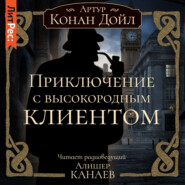По всем вопросам обращайтесь на: info@litportal.ru
(©) 2003-2024.
✖
Beyond The City
Настройки чтения
Размер шрифта
Высота строк
Поля
"And why not?"
"Against my principles, ma'am."
"But why?"
"Because woman has her duties and man has his. I may be old-fashioned, but that is my view. Why, what is the world coming to? I was saying to Dr. Walker only last night that we shall have a woman wanting to command the Channel Fleet next."
"That is one of the few professions which cannot be improved," said Mrs. Westmacott, with her sweetest smile. "Poor woman must still look to man for protection."
"I don't like these new-fangled ideas, ma'am. I tell you honestly that I don't. I like discipline, and I think every one is the better for it. Women have got a great deal which they had not in the days of our fathers. They have universities all for themselves, I am told, and there are women doctors, I hear. Surely they should rest contented. What more can they want?"
"You are a sailor, and sailors are always chivalrous. If you could see how things really are, you would change your opinion. What are the poor things to do? There are so many of them and so few things to which they can turn their hands. Governesses? But there are hardly any situations. Music and drawing? There is not one in fifty who has any special talent in that direction. Medicine? It is still surrounded with difficulties for women, and it takes many years and a small fortune to qualify. Nursing? It is hard work ill paid, and none but the strongest can stand it. What would you have them do then, Admiral? Sit down and starve?"
"Tut, tut! It is not so bad as that."
"The pressure is terrible. Advertise for a lady companion at ten shillings a week, which is less than a cook's wage, and see how many answers you get. There is no hope, no outlook, for these struggling thousands. Life is a dull, sordid struggle, leading down to a cheerless old age. Yet when we try to bring some little ray of hope, some chance, however distant, of something better, we are told by chivalrous gentlemen that it is against their principles to help."
The Admiral winced, but shook his head in dissent.
"There is banking, the law, veterinary surgery, government offices, the civil service, all these at least should be thrown freely open to women, if they have brains enough to compete successfully for them. Then if woman were unsuccessful it would be her own fault, and the majority of the population of this country could no longer complain that they live under a different law to the minority, and that they are held down in poverty and serfdom, with every road to independence sealed to them."
"What would you propose to do, ma'am?"
"To set the more obvious injustices right, and so to pave the way for a reform. Now look at that man digging in the field. I know him. He can neither read nor write, he is steeped in whisky, and he has as much intelligence as the potatoes that he is digging. Yet the man has a vote, can possibly turn the scale of an election, and may help to decide the policy of this empire. Now, to take the nearest example, here am I, a woman who have had some education, who have traveled, and who have seen and studied the institutions of many countries. I hold considerable property, and I pay more in imperial taxes than that man spends in whisky, which is saying a great deal, and yet I have no more direct influence upon the disposal of the money which I pay than that fly which creeps along the wall. Is that right? Is it fair?"
The Admiral moved uneasily in his chair. "Yours is an exceptional case," said he.
"But no woman has a voice. Consider that the women are a majority in the nation. Yet if there was a question of legislation upon which all women were agreed upon one side and all the men upon the other, it would appear that the matter was settled unanimously when more than half the population were opposed to it. Is that right?"
Again the Admiral wriggled. It was very awkward for the gallant seaman to have a handsome woman opposite to him, bombarding him with questions to none of which he could find an answer. "Couldn't even get the tompions out of his guns," as he explained the matter to the Doctor that evening.
"Now those are really the points that we shall lay stress upon at the meeting. The free and complete opening of the professions, the final abolition of the zenana I call it, and the franchise to all women who pay Queen's taxes above a certain sum. Surely there is nothing unreasonable in that. Nothing which could offend your principles. We shall have medicine, law, and the church all rallying that night for the protection of woman. Is the navy to be the one profession absent?"
The Admiral jumped out of his chair with an evil word in his throat. "There, there, ma'am," he cried. "Drop it for a time. I have heard enough. You've turned me a point or two. I won't deny it. But let it stand at that. I will think it over."
"Certainly, Admiral. We would not hurry you in your decision. But we still hope to see you on our platform." She rose and moved about in her lounging masculine fashion from one picture to another, for the walls were thickly covered with reminiscences of the Admiral's voyages.
"Hullo!" said she. "Surely this ship would have furled all her lower canvas and reefed her topsails if she found herself on a lee shore with the wind on her quarter."
"Of course she would. The artist was never past Gravesend, I swear. It's the Penelope as she was on the 14th of June, 1857, in the throat of the Straits of Banca, with the Island of Banca on the starboard bow, and Sumatra on the port. He painted it from description, but of course, as you very sensibly say, all was snug below and she carried storm sails and double-reefed topsails, for it was blowing a cyclone from the sou'east. I compliment you, ma'am, I do indeed! "
"Oh, I have done a little sailoring myself – as much as a woman can aspire to, you know. This is the Bay of Funchal. What a lovely frigate!"
"Lovely, you say! Ah, she was lovely! That is the Andromeda. I was a mate aboard of her – sub-lieutenant they call it now, though I like the old name best."
"What a lovely rake her masts have, and what a curve to her bows! She must have been a clipper."
The old sailor rubbed his hands and his eyes glistened. His old ships bordered close upon his wife and his son in his affections.
"I know Funchal," said the lady carelessly. "A couple of years ago I had a seven-ton cutter-rigged yacht, the Banshee, and we ran over to Madeira from Falmouth."
"You ma'am, in a seven-tonner?"
"With a couple of Cornish lads for a crew. Oh, it was glorious! A fortnight right out in the open, with no worries, no letters, no callers, no petty thoughts, nothing but the grand works of God, the tossing sea and the great silent sky. They talk of riding, indeed, I am fond of horses, too, but what is there to compare with the swoop of a little craft as she pitches down the long steep side of a wave, and then the quiver and spring as she is tossed upwards again? Oh, if our souls could transmigrate I'd be a seamew above all birds that fly! But I keep you, Admiral. Adieu!"
The old sailor was too transported with sympathy to say a word. He could only shake her broad muscular hand. She was half-way down the garden path before she heard him calling her, and saw his grizzled head and weather-stained face looking out from behind the curtains.
"You may put me down for the platform," he cried, and vanished abashed behind the I curtain of his Times, where his wife found him at lunch time.
"I hear that you have had quite a long chat with Mrs. Westmacott," said she.
"Yes, and I think that she is one of the most sensible women that I ever knew.
"Except on the woman's rights question, of course."
"Oh, I don't know. She had a good deal to say for herself on that also. In fact, mother, I have taken a platfom ticket for her meeting."
Chapter VI. An old story
But this was not to be the only eventful conversation which Mrs. Westmacott held that day, nor was the Admiral the only person in the Wilderness who was destined to find his opinions considerably changed. Two neighboring families, the Winslows from Anerley, and the Cumberbatches from Gipsy Hill, had been invited to tennis by Mrs. Westmacott, and the lawn was gay in the evening with the blazers of the young men and the bright dresses of the girls. To the older people, sitting round in their wicker-work garden chairs, the darting, stooping, springing white figures, the sweep of skirts, and twinkle of canvas shoes, the click of the rackets and sharp whiz of the balls, with the continual "fifteen love – fifteen all!" of the marker, made up a merry and exhilarating scene. To see their sons and daughters so flushed and healthy and happy, gave them also a reflected glow, and it was hard to say who had most pleasure from the game, those who played or those who watched.
Mrs. Westmacott had just finished a set when she caught a glimpse of Clara Walker sitting alone at the farther end of the ground. She ran down the court, cleared the net to the amazement of the visitors, and seated herself beside her. Clara's reserved and refined nature shrank somewhat from the boisterous frankness and strange manners of the widow, and yet her feminine instinct told her that beneath all her peculiarities there lay much that was good and noble. She smiled up at her, therefore, and nodded a greeting.
"Why aren't you playing, then? Don't, for goodness' sake, begin to be languid and young ladyish! When you give up active sports you give up youth."
"I have played a set, Mrs. Westmacott."
"That's right, my dear." She sat down beside her, and tapped her upon the arm with her tennis racket. "I like you, my dear, and I am going to call you Clara. You are not as aggressive as I should wish, Clara, but still I like you very much. Self-sacrifice is all very well, you know, but we have had rather too much of it on our side, and should like to see a little on the other. What do you think of my nephew Charles?"
The question was so sudden and unexpected that Clara gave quite a jump in her chair. "I–I – I hardly ever have thought of your nephew Charles."
"No? Oh, you must think him well over, for I want to speak to you about him."
"To me? But why?"
"It seemed to me most delicate. You see, Clara, the matter stands in this way. It is quite possible that I may soon find myself in a completely new sphere of life, which will involve fresh duties and make it impossible for me to keep up a household which Charles can share."
Clara stared. Did this mean that she was about to marry again? What else could it point to?
"Therefore Charles must have a household of his own. That is obvious. Now, I don't approve of bachelor establishments. Do you?"
"Really, Mrs. Westmacott, I have never thought of the matter."
"Oh, you little sly puss! Was there ever a girl who never thought of the matter? I think that a young man of six-and-twenty ought to be married."
Clara felt very uncomfortable. The awful thought had come upon her that this ambassadress had come to her as a proxy with a proposal of marriage. But how could that be? She had not spoken more than three or four times with her nephew, and knew nothing more of him than he had told her on the evening before. It was impossible, then. And yet what could his aunt mean by this discussion of his private affairs?
"Do you not think yourself," she persisted, "that a young man of six-and-twenty is better married?"

















